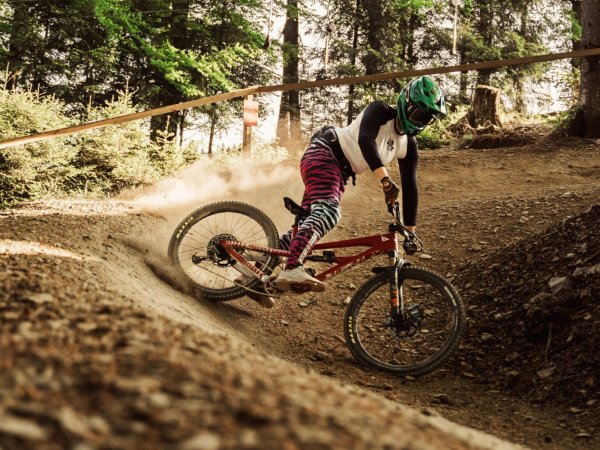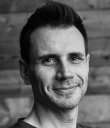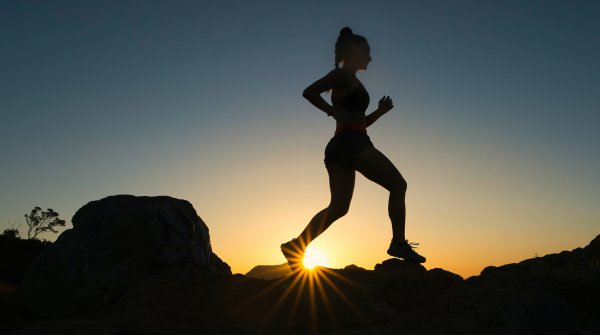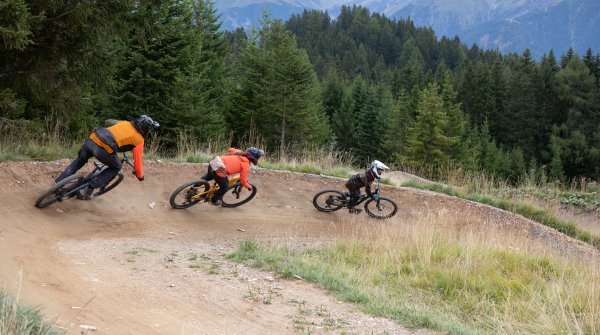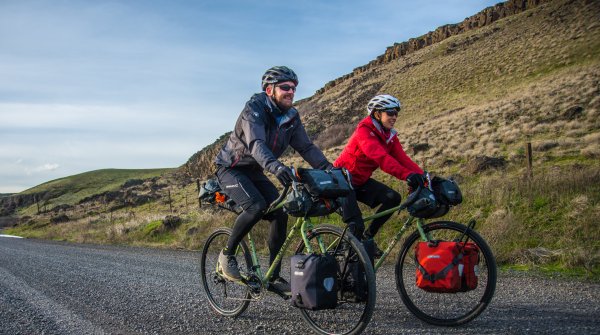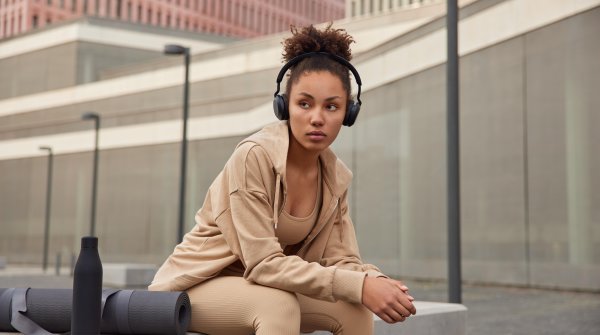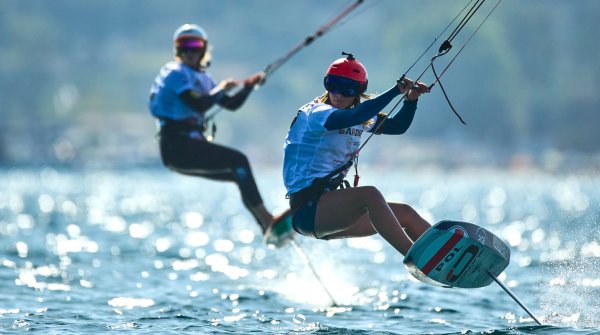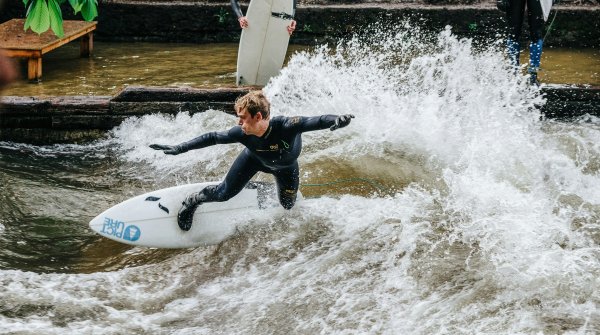"When hikers see us in the bike park, some ask us why you're doing something so extreme and not something normal? But who says what is normal? Society? And which part is that then?" asks Annelina Knauf, one of the few self-confessed transgender mountain bikers, who jumps over gaps on her YT Capra mountain bike, "falls down" meter-high drops and rides the roughest enduro trails. Even as a small child, she knew that she didn't want to be a man. But she plays her role as a boy so well over the years that even her closest family don't realize how she actually thinks and feels. "You deserve an Oscar," says her father after she comes out.
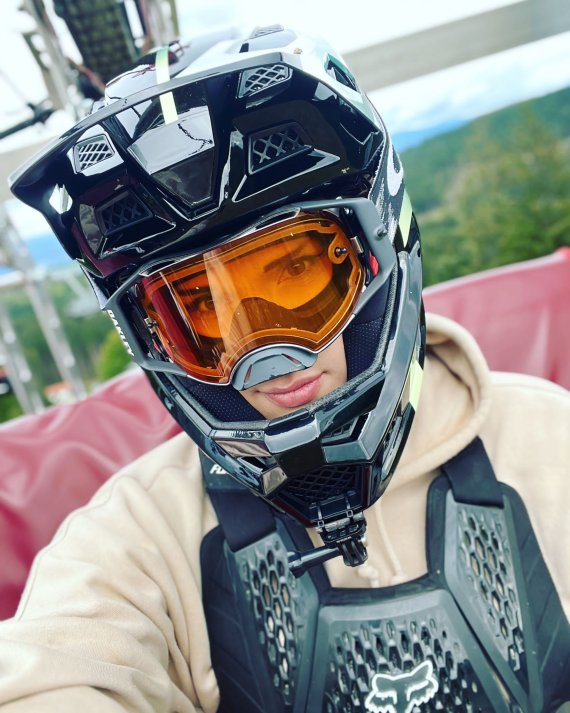
But suppressing her feelings and not really knowing how to fix this "wrong feeling" is emotionally draining. Annelina, then still André, becomes quarrelsome and aggressive - even towards those close to her. She tries to deal with everything herself. Mountain biking distracts her, especially the adrenaline of the downhill. It becomes her medicine to get a grip on her feelings and not burden those around her even more. "In the end, I didn't even look at the tough trails and key sections, I just rode them as fast and aggressively as I could."
The harsh consequences of this behavior followed in August 2022. She crashes heavily on the Bergstadl trail in the Austrian bike park Saalbach-Hinterglemm. Diagnosis: complicated acromioclavicular joint fracture. The result: a ten-week break from adrenaline and her usual downhill medicine. "When I had no choice but to be alone with myself, it was the first time I really felt how bad I was actually feeling."
The injury break leads to the realization that she no longer wants to live in the wrong body. In November 2022, Annelina goes partying in Leipzig's left-liberal club scene - the tough mountain biker's first public appearance as a woman. She feels comfortable in her outfit - finally.
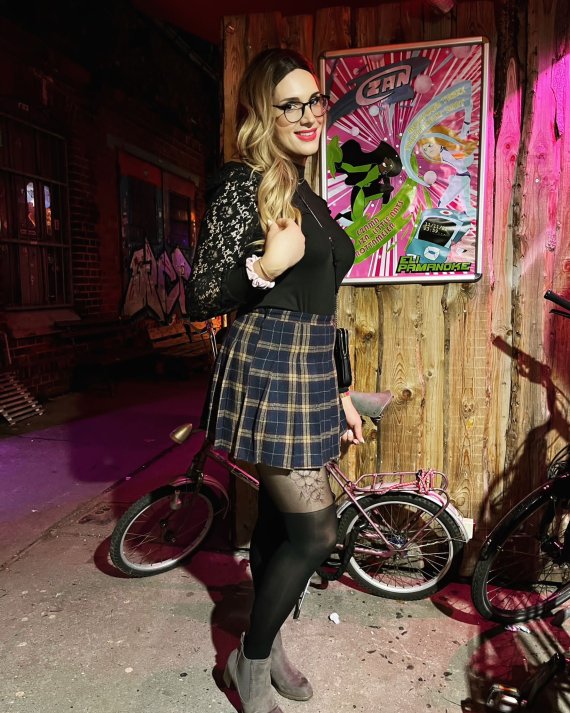
However, her first party night as a woman ends with a disastrous action on the way home: "I was happier than I'd ever been. So happy that I wanted to die," describes Anne. She drives her car at full throttle into a highway bridge pillar. The suicide attempt fails - and triggers a rethink. Anne decides that she wants to be happy in the long term and live as a woman. This requires professional help: among 20 psychiatric clinics, she finally finds a facility in Zwickau that is designed to help trans people on their journey.
Gender reassignment: from expert opinion to surgery
In order to gain access to medical and legal steps for gender reassignment, trans people in Germany have to fulfill various formalities and go through various processes. A change of first name and marital status is decided by the courts. At the moment, this requires two expert opinions from independent experts. However, a new self-determination law is due to come into force in 2024, which will make it easier to officially align gender identity and gender registration.
The diagnosis of transsexuality / transidentity / gender dysphoria / gender congruence usually comes first. A medical opinion, also known as an indication report, is also required for measures such as hormones or operations. This is drawn up according to different criteria than those for a name change. The majority of health insurance companies also require expert opinions and other documents to cover the costs. These can include an indication for the surgery from the therapist, a trans CV with a personal statement, specialist findings and reports on preliminary discussions or the course of therapy. A large proportion of the costs, for example for expert opinions, are often not covered by the health insurance.
On the way to a new identity, it becomes clear how difficult it is for many people to deal with transgender people. Questions arise: Is it a mental disorder? Is it something like an identity birth defect that can be permanently corrected? There are also social issues behind this and therefore even a legal problem: is it a medical condition? Who pays for gender reassignment? The topic involves many bureaucratic hurdles ...
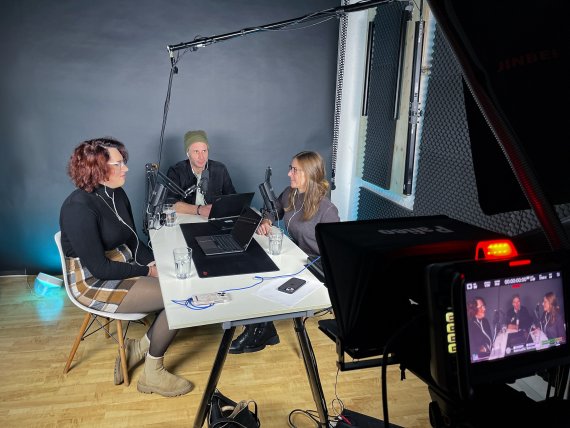
ISPO Brand Strategist Chris Beaufils talks to Anneline Knauf, Marie-Therese Riml and Bine Herzog about Anne's inspiring story, the MTB community and transgender in professional sports in the latest sportingWOMEN podcast.
The young sportswoman meticulously plans her admission to the psychiatric ward. She sends over 20 multi-page letters to family and friends in which she describes her motives and plans in detail and which are supposed to arrive when her therapy begins. But Deutsche Post thwarts her plans and delivers the letters earlier than planned. "I thought the Amazon courier was ringing and suddenly my grandpa was at the door and just said lovingly: 'Come with me - grandma has made lunch!" Anne then came out within the immediate family circle before starting therapy in Zwickau.
Another big step follows after her therapy: Freeride André becomes Freeride Anne. This is what the mountain bike influencer now calls herself on Instagram, where she wants to entertain, inspire and, above all, encourage people to live life to the full after her experiences. Following the example of New Zealand downhill World Cup rider Kate Weatherly, she records a reel - it's her coming out.
"After that, I turned off my phone and didn't look at it again for a while." Anne lost an incredible 80 percent of her followers within a very short space of time. But this also showed the "cool side of the mountain bike community", says Anne. She receives many comments, including well-known people from the mountain bike scene. Downhill World Cup rider Jasper Jauch is impressed and supportive: "So strong, you're going through it." Community icon and Girls Shred founder Bine Herzog invites Anne directly to the Girls Shred event in Serfaus-Fiss-Ladis. The motto: community over competition. "It doesn't matter what you can do or who you are. It's all about having a good time together," says Anne about the support from the mountain bike community. It's obvious how much it means to her.
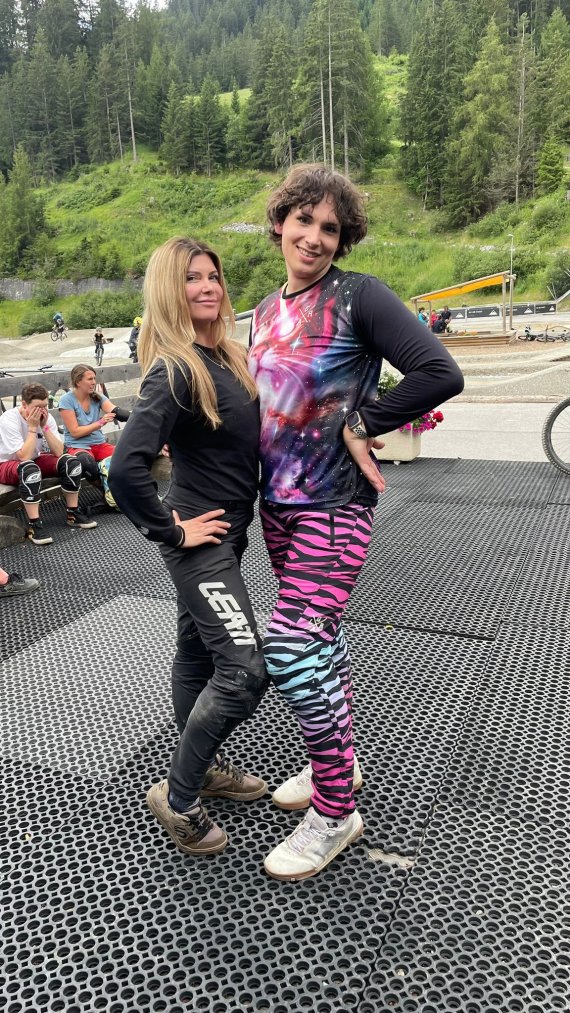
It is important to Anne to encourage people to stand up for themselves: "Many people are afraid to come out. I don't see myself as the first transgender mountain biker in Germany. Unfortunately, I'm just one of the few who have managed to say: 'Hey guys, this is me. This is how it is now'." Even if she wouldn't call herself that - with many new followers, she has become a symbol for the LGTBQ+ community.
"Anne is such an impressive mountain biker. She symbolizes that we need much more inclusivity in sport. Everyone is welcome here - regardless of their background," says Marie-Therese Riml from Bike Republic Sölden, who selected Anne as an ambassador and model for 2024. "This is exactly what we want to promote with the new campaign in Sölden. Anne is a perfect fit, and we hope so much for her that she gets enough support for her difficult operations."
Despite matching outfits, make-up, hairstyle and her feminine, trained voice, Anne's above-average height and facial features make her look masculine - for now. This is set to change over the next two years. Anne already has the necessary certificate (see info box above) and has also started the accompanying hormone therapy. But the real challenges still lie ahead: The so-called GAO (gender reassignment) and FFS (facial feminization surgery) will cost well over EUR 50,000.
GAO & FFS
Male-to-female sex reassignment surgery (GAO) is usually performed in two operations. In the first operation, the penile erectile tissue and testicles are removed, a neovagina is created and the urethra is shortened. A neoclitoris is reconstructed from the glans penis. In a second, in most cases customized operation, functional and aesthetic corrections are made.
Male and female faces differ in terms of secondary sexual characteristics, such as differences in the nose, forehead, jaw or chin. Accordingly, facial feminization surgery (FFS) involves a series of soft tissue and bone procedures to surgically give the face a more feminine appearance. Depending on the extent, the operations can include nose and cheek corrections, jaw and forehead surgery or an enlargement of the lips, as well as a reduction of the Adam's apple.
The risk of injury to the face and head will remain high due to reconstruction and correction of the bones (FFS) around the forehead, jaw and chin. There are also many other challenges to overcome. It's all about testosterone, muscle percentage and psyche. Transgender athletes in particular run the risk of suffering excessively from testosterone deficiency during hormone therapy. This also affects athletic performance: altered bone density, muscle fiber changes and permanently reduced strength and endurance are just some of the risks.
Like most influencers in sport, Anne cannot make a living from this alone and works full-time for a very understanding and enlightened employer in the chemical industry. Nevertheless, the costs are overwhelming, considering that very large sums have already gone towards co-payments, fees and private treatments to date. This is why she has launched a Go Fund Me campaign. It is not easy for her to ask for public support. But anyone who knows Anne knows that her example will give the sport of mountain biking a new and exciting angle and make it more visible.
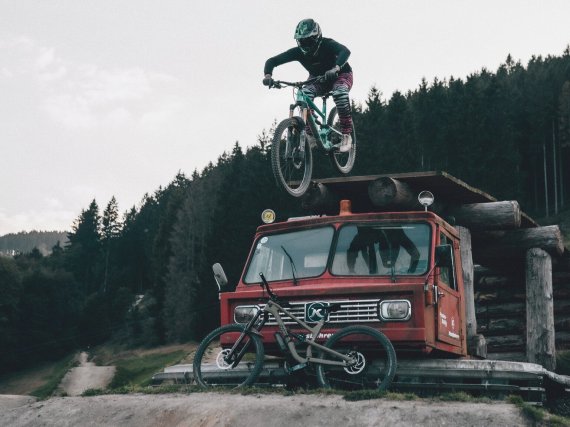
And so the young athlete's story touches on another topic that is not easy to deal with, especially in professional sport. She is keen to compete in Downhill Cup races and says herself that there are anatomical and biological differences between men and women and that sport is currently reaching its limits in the context of transgender people. For Anne herself, it is clear that there must be distinctions between men and women, especially in professional sport and competitions. The discussion surrounding downhill World Cup rider Kate Weatherly has already shown this.
Kate Weatherly
The two-time New Zealand downhill mountain biking champion and former World Cup rider is an openly transgender woman. At times, clear leads at the New Zealand championships sparked an international debate about competitive equality and fairness in women's downhill when transgender athletes participate, despite Weatherly meeting the testosterone guidelines set by the federation.
Weatherly had to end her international career for the time being due to updated UCI regulations in 2023. Through her participation in national races, her work with the federation and as a coach, she continues to be part of the Kiwi mountain bike scene and an advocate for LGBTIQ+ people in sport.
On the one hand, biologically speaking, male bodies can have clear advantages due to more muscle mass and testosterone. However, transgender women in particular run the risk of suffering from additional injury risks due to testosterone deficiency, surgery and psychological stress when undergoing hormone therapy. There is a lot of uncertainty and the issue becomes political as soon as regulations on fairness in professional sport are juxtaposed with inclusion in sport.
The world governing body UCI (Union Cycliste Internationale) has adapted the applicable rules for international competitions several times and refers to the current state of research. Since July 2023, the UCI rules have excluded transgender athletes who have completed their transition after (male) puberty from participating in women's competitions on the international UCI calendar. They are allowed to take part in men's competitions.
"As a transgender athlete, you have to find your own stance on this, help shape the rules and, if necessary, back down if you want to be authentic and be taken seriously," says Anne. She also had to acquire such insights and opinions over the past twelve turbulent months. "I've learned a lot. About myself, society and sport. My horizons have broadened." She owes it all to mountain biking and, thanks to the MTB community, feels strong enough to overcome the challenges ahead of her. "Maybe there's someone else who feels this way," she writes on Instagram and wants to encourage others. Her Instagram channel and even her WhatsApp profile are a call to action: "Make it happen girl. Shock everyone."
- ISPO awards
- Mountain sports
- Bike
- Design
- Retail
- Fitness
- Health
- ISPO Job Market
- ISPO Munich
- ISPO Shanghai
- Running
- Brands
- Sustainability
- Olympia
- OutDoor
- Promotion
- Sports Business
- ISPO Textrends
- Triathlon
- Water sports
- Winter sports
- eSports
- SportsTech
- OutDoor by ISPO
- Heroes
- Transformation
- Sport Fashion
- Urban Culture
- Challenges of a CEO
- Trade fairs
- Sports
- Find the Balance
- Product reviews
- Newsletter Exclusive Area
- Magazine
